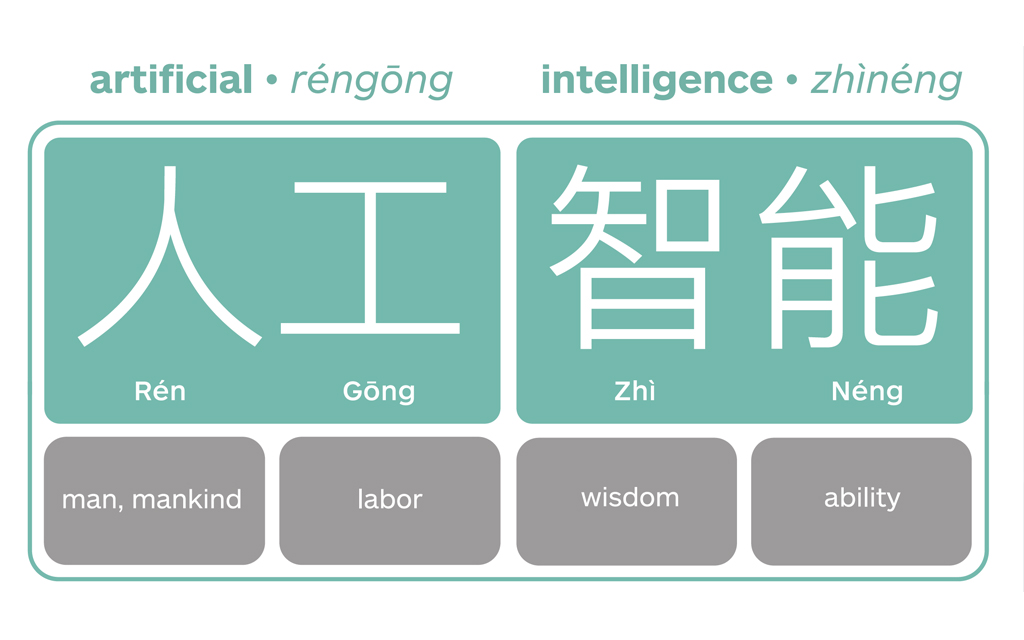Technology
Is AI perceived and proposed in the same way in different cultures? Guglielmo Maccario and Lara Bruno analyze the differences in AI ethics and practices between the two leading countries in the sector, China and the United States.
Two countries are at the forefront in the race for Artificial Intelligence (AI): US and China. Although the US has been leading AI Research since its early stages, China reduced the gap in less than a decade thanks to audacious policies and heavy investments. As a result, the Chinese AI market grew from approximately 13 billion yuan in 2016 to over 128 billion yuan in 2020.
In this article, we examine the visions and differences of the two leading countries in AI development, the US and China, starting from the terminological roots of the issue: what does AI mean in Chinese and English? Can the absence of a precise, agreed definition of Artificial Intelligence (AI) have practical consequences on its global development and monitoring?
Artificial intelligence has radically transformed the established order of modern societies, affecting both personal and professional human interactions. As AI progresses into new spheres of applications, taking on increasingly sophisticated duties, its technology-enabling nature has made it a crucial factor in competition among countries worldwide.
SinceJohn McCarty’s study group introduced the term artificial intelligence for the first time in 1955, scholars and linguists have vehemently debated its definition. Coined at a conference in Dartmouth to describe a branch of computer science, AI is still a term that causes terminology headaches. In a 2022 white paper on the technological development of AI in China published by the Center for Security and Emerging Technology, the authors outline China’s plan to become global AI leader by 2030 and achieve a “first mover advantage” 先 发 优势. In their introduction, the researchers emphasize that there is no clear consensus on what AI means.
To cast light on the cultural and linguistic nuances of AI and the Chinese language, we interviewed Lara Bruno, Ph.D. in Intercultural relations, sinologist, and interpreter.
GM: Dr. Bruno, as a sinologist, could you explain the differences in how AI is referred to in Chinese and English?
LB: In Chinese, artificial intelligence is known as 人工智能 (réngōng zhìnéng). Considering the broad scope of imagery and meanings that the Chinese language encompasses, it is interesting to analyze this term for a better understanding of the Chinese perception of artificial intelligence.
人工 (réngōng), which literally means artificial, is composed of the term man, mankind ( 人 ) and labor, manpower ( 工 ). Artificial in the Chinese language is thus something that originates in human nature and comes from human labor. In English, the term artificial similarly refers to something that is “not natural or spontaneous,” but “made by man, contrived by human skill and labor.” However, in the analysis of the Chinese word, we do not find any mention of the concept of art, which is instead present in the Latin etymology: artificialis “belonging to art,” from artificium “a work of art; skill; theory, system,” from artifex (genitive artificis) “craftsman, artist, master of an art.” Artificial is clearly contrasted in both cultural spheres with the concept of natural or 天然 (tiānrán), literally, the promise of heaven. This contrast in the contemporary world is challenged by the legitimate reflection on the naturalness of all that is created by humans, since humankind is part of nature.

The Chinese term intelligence is represented in this expression by 智能 (zhìnéng). Zhìnéng can be translated as intelligent, capable, or smart, and is commonly associated with devices such as telephones, or systems such as bombs (smart bombs). Zhìnéng contains 智 (zhì) wisdom, intelligence being composed of 曰 (yuē) mouth-speaking and knowledge 知 (zhī) and 能 (néng), meaning power, ability. Intelligence is represented here as the ability to be knowledgeable, to be wise. The English term intelligence comes from the Old French word intelligence (12c.) and directly from the Latin word intelligentia “understanding, knowledge, power of discerning; art, skill, taste,” from intelligentem (nominative intelligens) “discerning, appreciative,” present participle of intelligere “to understand, comprehend, come to know,” and from the assimilated form of inter “between” + legere “choose, pick out, read.” In western culture, intelligence not only refers to the ability to acquire and use knowledge, but also the ability to choose and discern, and thus recognize and solve problems. The point is that finding an objective and absolute definition of what intelligence is has been and continues to be a controversial issue.

World Wide Wisdom
Research Report 2023
It is possibile to improve the understanding between people that speak different languages and thus improve their ability to do things together in a smarter way? Can it be that a multilingual group is able to do better things? In order to answer to these questions we need to take into account how groups of people think and work together and how their collaboration can be improved.
Get Your Copy Now!GM: Dr. Bruno, in your opinion, how have these differences in how AI is understood and approached in Chinese and English affected the development of AI in China and the rest of the world?
LB: One potential impact is that these differences can affect how researchers and practitioners in different countries approach and think about AI, which is obviously strictly linked to the philosophical and cultural background of each country.
For example, if we address how the Protestant Ethic and Confucianism influence technology policy in the US and China, we must consider that the former places a strong emphasis on each person’s rights and responsibilities, and the latter believes that leaders are capable of leading their followers to a peaceful society. It is clear that whereas Confucianism may compromise individual liberties, the Protestant ethic seeks to dominate nature while not always prioritizing the group.
In western culture, intelligence not only refers to the ability to acquire and use knowledge, but also the ability to choose and discern, and thus recognize and solve problems.
However, both share characteristics which, with a change of perspective, could be seen as contributing to the development of a healthy human community.
Another potential impact is that the unique terms and concepts related to AI in Chinese may make it more difficult for international researchers and practitioners to fully understand and engage with the work being done in China. This could create barriers to collaboration and exchange between the Chinese and international AI communities. On the other hand, the diversity of approaches and perspectives on AI can also be a strength, as it allows for different ways of thinking about and tackling the challenges and opportunities presented by AI.
Just as the effect of technology depends on its use, AI will likely be viewed as both a threat and a force for good, similar to how a knife can both save and kill lives. Whether we can coexist harmoniously with AI will depend on how we use and interact with it.
GM: Dr. Bruno, you mentioned earlier that the Chinese language has a rich tradition of philosophical and moral thought and that these ideas are often woven into discussions of AI in China. Could you elaborate on how ethics frame the development and use of AI in China?
LB: As I previously mentioned, cultural differences and diverse philosophical backgrounds certainly influence the ethical approach to AI in Western and Eastern societies.
With regard to China, many people think that Taoist and Confucian ideas, which hold that anything created by humans is unworthy because it disturbs the natural order of the cosmos, are to blame for slowing down China’s technological advancement. On the other hand, Professor Gai Fei’s study on how beliefs about celestial beings in Eastern and Western cultures have influenced our modern vision of artificial intelligence argues differently.
In Greek mythology and monotheistic religions the gods are, of course, portrayed as superior to humans. In Chinese mythology, supernatural beings are more approachable, playing a more interactive and reciprocal role in human life. This perspective on supernatural beings crossing boundaries with natural beings fosters a bond between humans and deities. A logical tenet of this belief structure is that an artificial being endowed with superhuman intelligence is unlikely to be considered as part of a competitive hierarchy with humans. Instead, as a supernatural force, AI can peacefully coexist with humans, even allowing them to become “superhuman” through technological collaboration. This concept stems from ancient Daoist thought (道家思想) and is pursued by several Chinese scholars and practitioners in the field of AI, who often draw on other traditional Chinese philosophical concepts, such as the idea of harmony (和谐 héxié), to guide their thinking about the ethical implications of AI. The concept of harmony in Chinese philosophy comes from Confucianism and emphasizes the importance of balance and cooperation; it is often invoked in discussions about the ethical use of AI and the need to ensure that AI is developed and used in a way that benefits all members of society.
The ethical implications of AI are taken very seriously in China, and the government has made efforts to ensure that AI is developed and used in a way that is responsible and beneficial to society. For example, China’s Ministry of Science and Technology established The National New Generation Artificial Intelligence Governance Expert Committee in March 2019, which issued eight AI governance principles in June 2019. The principles emphasized that above all, AI development should begin with improving humanity’s overall well-being. The principles also emphasized respect for human rights, privacy, and fairness. Finally, they stressed the significance of transparency, accountability, collaboration, and agility in dealing with new and emerging risks (Laskai and Webster, 2019). However, China’s discussions regarding the ethics of AI do not change the fact that, as an authoritarian state, certain aspects of the Chinese government’s use of AI continue to engender deep concern.

China
Language Data Factbook
The Language Data Factbook project aims to make the localisation of your business and your cultural project easier. It provides a full overview of every country in the world, collecting linguistic, demographic, economic, cultural and social data. With an in-depth look at the linguistic heritage, it helps you to know in which languages to speak to achieve your goal.
Read it nowIn this interview, we had the opportunity to talk with Dr. Bruno, a sinologist with expertise in Chinese language and culture. Dr. Bruno highlighted a general mismatch between the Chinese language and China’s policies concerning ethics and AI. Notably, there is a common belief in the West that China does not appreciably engage in discourse about AI ethics when, on the contrary, Chinese AI principles generally align with the global perspective, and discussions of AI ethics have strong government backing. However, despite the philosophical and moral aspects concerning how Chinese culture and language are reflected in its approaches to AI, it is also true that there are valid concerns about how the country could use AI going forward.
Although the Chinese government has jointly established ethical guidelines for AI development together with a national AI ethics committee, the country also made clear in its 2017 “New generation AI Development Plan” that it aspires to become the global leader in Artificial Intelligence by 2030. Can this goal be achieved without risks?
China has the largest online population in the world, with 1.01 billion internet users, and its use of AI to analyze and process large amounts of personal data raises concerns about the potential risks to privacy and individual rights.
In 2021, the country passed the Personal Information Protection Law (PIPL), the first comprehensive legislation on personal information and data privacy that resembles the European GDPR, but how China will implement the legislation amid strict online censorship and rising political tension is yet to be seen. While some western companies, such as Linkedin and Yahoo, have decided to halt their business in China after the PIPL’s enactments, massive data leaks of personal information have made headlines.
In early 2022, millions of faces and car license plates stored in a Chinese database were inadvertently made publicly accessible for months before being silently removed in August of the same year. In addition several newspapers reported a significant data leak of 1 billion records from a Shanghai police database the same year.
Despite the fact that these leaks were most likely due to human error, the dangers of AI-enhanced surveillance systems are clear. Security researchers warn that the weaponization and abuse of AI are a real threat to personal security.

Guglielmo Maccario
European Central Bank/ UNINT University
Guglielmo Maccario is a Contract Professor in Development Studies at UNINT University, where he earned his Ph.D. in International Management in 2022. Passionate about communication and languages, Guglielmo started his career in an advertising agency and then worked in UN specialized agencies in Rome. With a Bachelor’s degree in foreign languages, he lived in Beijing for two years, where he studied Chinese and worked in the Marketing sector.
Photo credit: Deepmind, Unsplash
